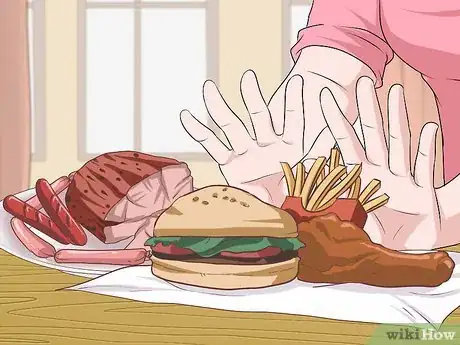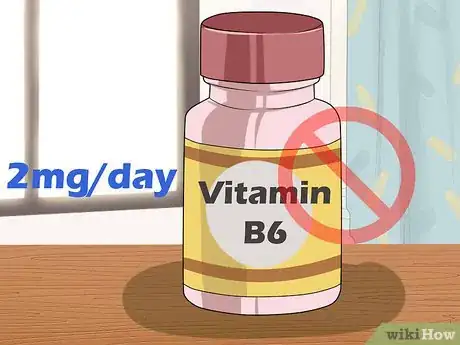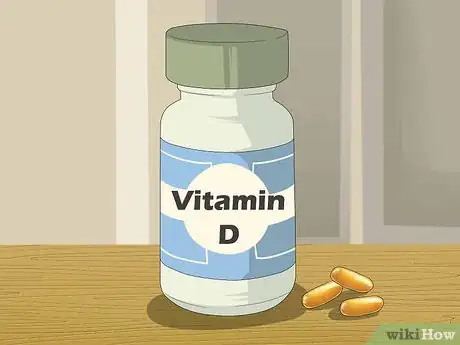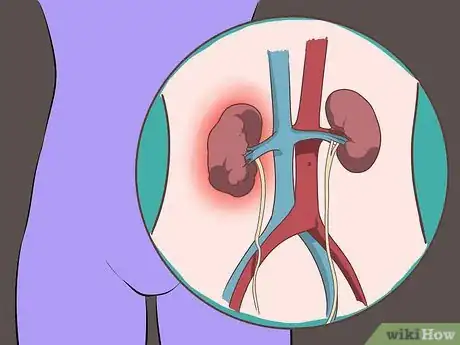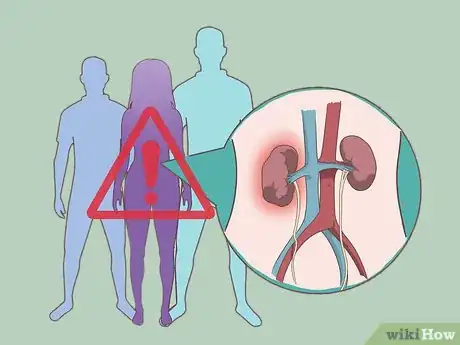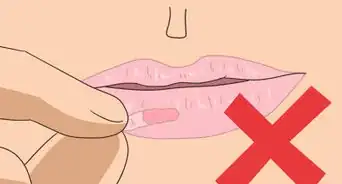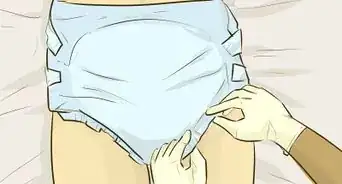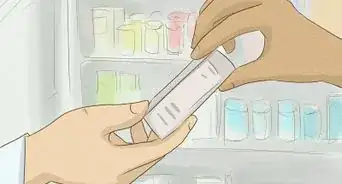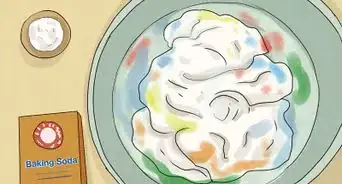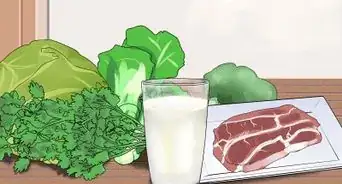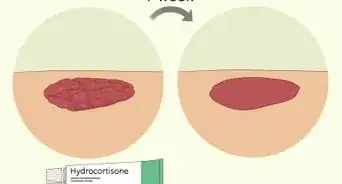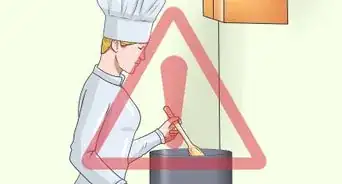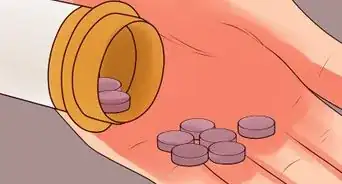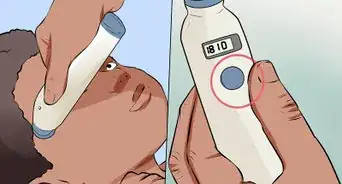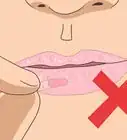This article was medically reviewed by Janice Litza, MD. Dr. Litza is a board certified Family Medicine Physician in Wisconsin. She is a practicing Physician and taught as a Clinical Professor for 13 years, after receiving her MD from the University of Wisconsin-Madison School of Medicine and Public Health in 1998.
There are 30 references cited in this article, which can be found at the bottom of the page.
This article has been viewed 30,080 times.
Kidney stones are small formations of minerals and other chemicals that occur in the kidneys and are passed out through the urinary tract. Sometimes, they grow so large that they get stuck and cause immense pain. While men are at higher risk of developing kidney stones,[1] women are getting them at increased rates.[2] Learn how to reduce your risk of developing stones.
Steps
Maintaining a Healthy Lifestyle
-
1Stay hydrated. Drinking lots of water (roughly 8-10 glasses per day) will help you eliminate the different kinds of wastes that can build up and develop into kidney stones. Proper hydration will also help you keep your urine’s PH level balanced, which will reduce the risk of forming phosphate-based kidney stones.[3]
- If you have an especially active lifestyle or live in a hot climate, drinking more water will be necessary to stay properly hydrated.
-
2Don’t drink soda. Diets high in soda are associated with an increased risk of kidney stones due to their high sugar and phosphate content.[4]
-
3Balance calcium and oxalate-rich foods. One of the most common kinds of kidney stone forms when too much calcium or oxalate builds up in the renal system. These are known as calcium-oxalate stones.[5] Calcium is typically found in dark green vegetables, dairy products, and animal protein.[6] Oxalate (or oxalic acid) is a compound that generally comes from plants.[7] Both are healthy in moderation. Keeping your intake of dietary calcium and oxalate balanced will cause the calcium and oxalate to bind to each other in the intestines, reducing the amount of either that the kidneys will absorb.[8] [9]
- The most commonly-consumed oxalate-rich foods are chocolate, rhubarb, tea, spinach, strawberries, wheat bran, nuts, and beets.
- Don’t restrict your calcium intake too much. Low levels of calcium can also lead to kidney stones.
-
4Avoid consuming too much sodium. Too much sodium in the diet may increase your calcium level to a point where you will run a higher risk of developing kidney stones.[10]
- Talk to your doctor to determine an appropriate level of sodium for your diet.
- Processed foods such as hot dogs, canned soups, lunchmeats, and fast foods frequently contain high levels of sodium.[11]
-
5Cut back on animal protein. Eating too much animal protein may increase the amount of calcium in your body, as well as uric acid, which can collect in the kidneys and turn into stones. Although overconsumption of animal protein is a greater risk factor for kidney stones in men than in women, it is probably safest to avoid it no matter what.[12]
- Red meats, organ meats, and shellfish are particularly high-risk forms of animal protein.[13] They contain high levels of purines, which are substances that can increase uric acid content in urine.[14] These foods, along with poultry, also reduce your production of citrate, which can stop stones from forming.[15]
-
6Maintain a healthy weight. Obesity is another serious risk factor for developing kidney stones, particularly in women.[16]
- Calculating your Body Mass Index (or BMI) is a good starting point for determining if you are at a healthy weight for your height.[17]
- A BMI between 18.5 and 24.9 is considered normal.
Being Careful With Medications
-
1Avoid taking too many calcium supplements. Moderate levels of dietary calcium can help you avoid kidney stones. But your body might not absorb supplemental calcium as easily, and too much of it can build up in your kidneys and lead to stones.[18]
- Calcium supplements can be useful for helping with osteoporosis, which women commonly encounter later in life. Unfortunately, your risk of developing kidney stones as a result of taking too many calcium supplements goes up as you age.[19] Therefore talk to your doctor to determine if calcium supplements are necessary for you, and if so, at what level. Remember that your body will typically absorb nutrients more easily if they are consumed as food rather than supplements.
-
2Get the recommended 2mg of vitamin B6 daily. The recommended daily allowance (RDA) of vitamin B6 is 2mg, and doses higher than that have not been shown to decrease your risk of kidney stones.[20] Get the recommended daily amount to reduce your risk, but avoid taking megadoses of B6.
-
3Stick with the recommended 60mg of vitamin C daily. Taking too much vitamin C can reduce your risk of kidney stones, but vitamin C is an essential vitamin for good health. Therefore, just aim for the recommended daily amount of vitamin C. Do not take large doses of it.[21]
- Try drinking a glass of lemonade or water with a tablespoon of lemon juice added to it. You will get some vitamin C and potassium citrate, which can help to prevent kidney stones.[22]
-
4Consider taking vitamin D. Vitamin D supplements are commonly thought to increase your risk of developing kidney stones, but recent studies do not show a clear link between vitamin D supplement use and kidney stone development.[23] [24]
- As with calcium supplements, you should talk with your doctor before beginning any vitamin supplement regimen.
-
5Talk with your doctor about what medications you take might put you at risk for developing kidney stones. For instance, non-steroidal anti-inflammatory drugs (NSAIDs) like aspirin have been linked to a higher risk of developing kidney stones.[25]
Knowing When Your Risk For Kidney Stones Changes
-
1Be aware that some medical disorders can lead to kidney stones. Not all kidney stones form as a result of lifestyle or medicine usage.
- Chronic kidney infections can lead to struvite stones. Long-term antibiotic use may be required to prevent these stones from forming regularly.[26]
- Some stones form due to a genetic disorder called cystinuria which causes an overproduction of the chemical cystine in the urinary tract. If left untreated, excess cystine can also develop into stones.[27]
- Other disorders like hyperthyroidism, gout, and urinary tract infections can also increase your risk of developing kidney stones.[28]
-
2Understand if your age will contribute to your risk of developing kidney stones. Although anyone can get kidney stones (even children) the chances that you will develop them go up between the ages of 20 and 40.[29]
-
3Be especially careful if kidney stones run in your family. If one of your immediate relatives has had a kidney stone, you are 60% more likely to develop a stone. [33]
Warnings
- Be careful about your medication and never consume expired or tainted pills.⧼thumbs_response⧽
References
- ↑ https://www.kidney.org/atoz/content/kidneystones
- ↑ https://rightasrain.uwmedicine.org/well/health/kidney-stones-in-women
- ↑ https://www.urologyhealth.org/healthy-living/care-blog/2019/hydrate-to-help-prevent-kidney-stones
- ↑ https://www.ncbi.nlm.nih.gov/pmc/articles/PMC3731916/
- ↑ https://my.clevelandclinic.org/health/diseases/15604-kidney-stones
- ↑ https://www.pcrm.org/good-nutrition/nutrition-information/health-concerns-about-dairy/calcium-and-strong-bones
- ↑ https://occup-med.biomedcentral.com/articles/10.1186/1745-6673-7-17
- ↑ https://www.kidney.org/atoz/content/kidneystones_prevent
- ↑ https://www.kidney.org/atoz/content/diet
- ↑ https://www.health.harvard.edu/blog/5-steps-for-preventing-kidney-stones-201310046721
- ↑ https://my.clevelandclinic.org/health/articles/4249-hypertension-and-nutrition
- ↑ http://www.ncbi.nlm.nih.gov/pubmed?term=15111375
- ↑ https://www.niddk.nih.gov/health-information/urologic-diseases/kidney-stones/eating-diet-nutrition
- ↑ https://my.clevelandclinic.org/health/diseases/16378-uric-acid-stones
- ↑ https://www.ncbi.nlm.nih.gov/pmc/articles/PMC4265710/
- ↑ http://www.ncbi.nlm.nih.gov/pubmed?term=15671430
- ↑ https://www.cdc.gov/healthyweight/assessing/bmi/adult_bmi/index.html
- ↑ http://www.ncbi.nlm.nih.gov/pubmed?term=9092314
- ↑ http://www.ncbi.nlm.nih.gov/pubmed?term=15111375
- ↑ https://www.peacehealth.org/medical-topics/id/hn-2928009
- ↑ https://www.kidney.org/news/newsroom/newsreleases/0150
- ↑ https://health.ucsd.edu/news/2010/pages/4-22-kidney-stones.aspx
- ↑ http://www.ncbi.nlm.nih.gov/pubmed/23689153
- ↑ http://www.ncbi.nlm.nih.gov/pubmed/23739765
- ↑ https://www.urmc.rochester.edu/news/publications/health-matters/daily-aspirin-worth-the-risks
- ↑ https://www.kidney.org/atoz/content/struvite-stone
- ↑ http://www.medicinenet.com/script/main/art.asp?articlekey=8529
- ↑ https://www.healthhub.sg/a-z/diseases-and-conditions/629/kidney-stones
- ↑ https://my.clevelandclinic.org/health/diseases/16378-uric-acid-stones
- ↑ http://www.ncbi.nlm.nih.gov/pubmed?term=9092314
- ↑ http://www.ncbi.nlm.nih.gov/pubmed?term=15111375
- ↑ https://www.cedars-sinai.org/health-library/diseases-and-conditions/k/kidney-stones.html
- ↑ https://pubmed.ncbi.nlm.nih.gov/9335385/
- ↑ https://intermountainhealthcare.org/ckr-ext/Dcmnt?ncid=520728251
- ↑ https://my.clevelandclinic.org/health/diseases/16378-uric-acid-stones



